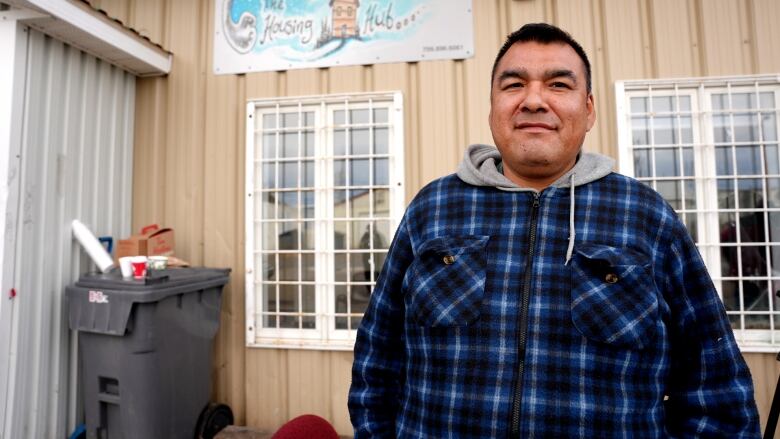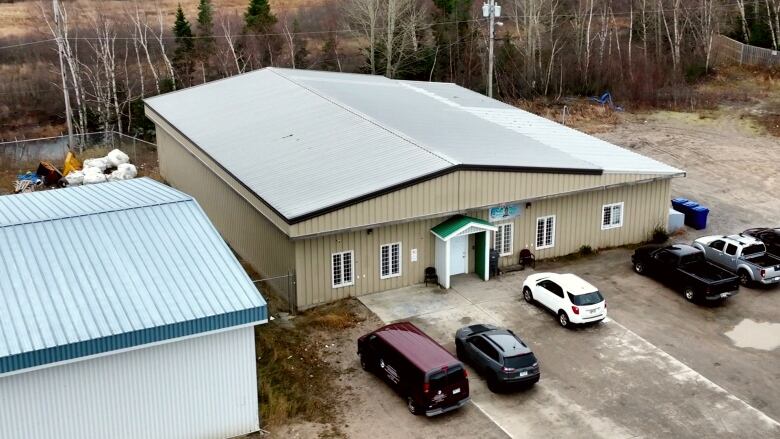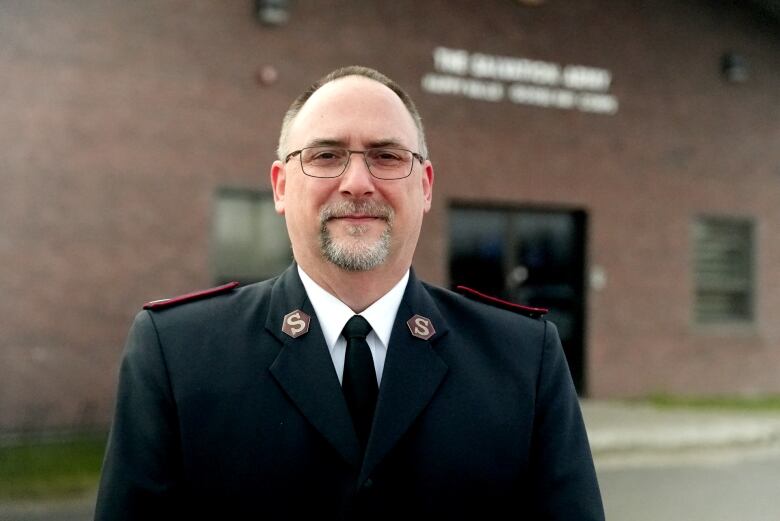Former court interpreter living at homeless shelter pleads for empathy in central Labrador
Kevin Pastiwet was working as an Innu-aimun translator before family deaths started him down a spiral, he said

A formerInnu-aimuncourt translator wholives at the Housing Hub says people in Happy Valley-Goose Bay need empathy and understanding to address the needs of transient people.
Kevin Pastiwet, one of an estimated 80 people who divides his time betweenthe homeless shelter and the town'strails system, says the transient population needs help from residents.
"Instead of judging people they should try to help in any way," said Kevin Pastiwet. "People don't know what we went through."
In recent weeks, residents have held ralliescalling for increased policing to address illegal activity while long-term solutions are put in place. The provincial justice and public safety minister recently visited thetown to meet with businesses and community organizations.
The Nunatsiavut government says more community support increased policing is needed,including a new building for the homeless shelter to help people get back on their feet.
Turning to drinking, drugs after losing hope
Pastiwet grew up in Davis Inlet before moving to Natuashish. He said he was clean and living with a common-law partner for about eight years. The two had two children and Pastiwet was working as an Innu-aimun interpreter with the court system and Legal Aid.
But when some of Pastiwet's close family members died, things changed, he said.
"[I] started losing hope and I started to get into heavy drugs, drinking," Pastiwet said. "The addiction took over in the relationship."

Pastiwet watched as his children were taken by provincial child services, and he lost his job and home. Now, Pastiwet said, he and his current partner live in the Housing Hub when they can get a room. When the Hub is full, he said, they sleep out on the trails as there isn't anywhere else to go.
The Housing Hub was built for eight beds but now holds 12. The Labrador Inn is also used as an overflow for-profit shelter.
"Usually, I'm up myself just to make sure she's not cold because sometimes it is very, very cold. Just make sure she's all right and use my jacket at times," Pastiwet said. "It's hard to go through with your partner."
Addressing systemic racism and larger shelter needed: Pastiwet
Pastiwet said there were supports when he was spiralling but "the addiction was too strong." More services are needed in Happy Valley-Goose Bay, he said.
"Some of us can't get access to [services] and some of us have the language barrier and I think a lot of us are scared to be laughed at," Pastiwet said, adding that governments need to address systemic racism in the court, justice and social services systems.
Pastiwetalso said Happy Valley-Goose Bay needs a bigger facility with more help for people in need, like him.

"They're gonna know that somebody's there to care, caring, and I think that would take a long way to getting that self-pride back," Pastiwet said.
Pastiwet said federal, provincial and local governments also need to work with Indigenous communities and leadership to restore the connection to culture for all Indigenous peoples.
"My ancestors were nomadic people that travel on land, that travel wherever the caribou went and there was no sickness, they were healthy. There was no diabetes," Pastiwet said. "I was raised on the land with my grandparents and there were no worries there."
He said that changed when churches and governments forced them to live in specific locations, like Davis Inlet, where there was no running water or sewer.
"We need to educate our children as well through culture, because it's important," he said. "Very, very important."
Salvation Army calls for people to get off social media and help
The Happy Valley-Goose Bay Salvation Army is one of the community organizations working to help people in the short term with meals and basic necessities.
It has received funds through Reaching Home Indigenous N.L. to operate a community needs van and have an outreach worker to help those in need on the trails. Maj. Byron Kean saidmore needs to be done to understand how someone becomes homeless.
"It's working with them, sitting down with them and allowing them to speak into the situation that they find themselves in," Kean said. "And it's heartbreaking when you consider it, to hear about the trauma, the addictions, the mental health issues that they're facing."
Keansaid it's going to be a difficult winter if some issues aren't addressed.
"It's not putting a rant on social media. Social media to me is something that's holding us back because it's creating a situation where these individuals are being more stigmatized than they already have been," Kean said.
"It's time to get off of social media and to actually be a part of the solution," he said."We all have a part to play."

With files from Danny Arsenault and Rafsan Faruque Jugol












_(720p).jpg)


 OFFICIAL HD MUSIC VIDEO.jpg)
.jpg)



























































































